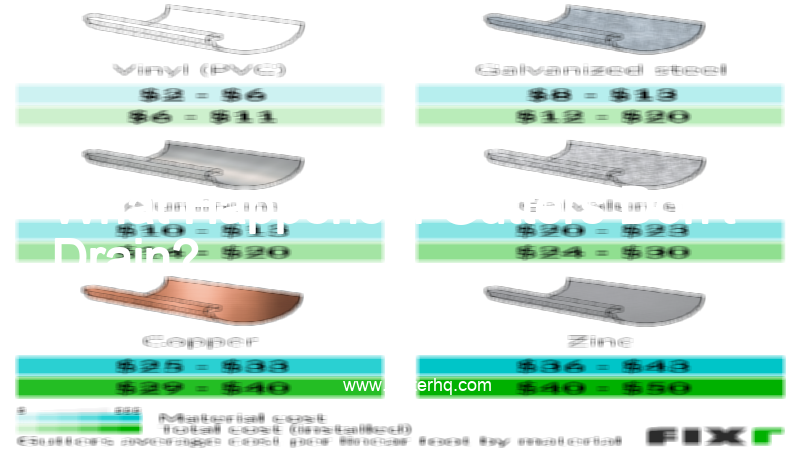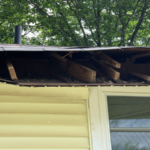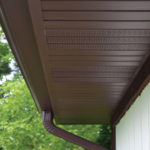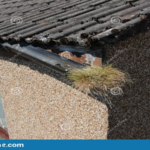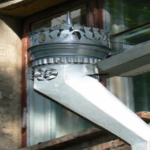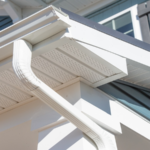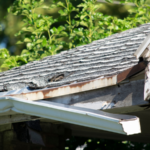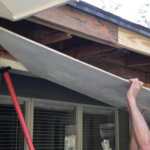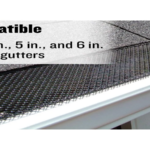If gutters don’t drain properly, rainwater can back up and cause damage to your roof and your home’s foundation. Clogged gutters can also lead to ice dams in the winter, which can cause even more damage to your home.
What happens if gutters don’t drain?
If gutters don’t drain, water can build up and cause damage to the gutters, the roof, and the foundation of the house. Water can also leak into the house through the gutters, causing water damage to the ceilings, walls, and floors.
Is it OK for water to sit in gutter?
No, it is not okay for water to sit in gutters. Gutters are designed to channel water away from your home and foundation, and when water sits in them, it can cause a number of problems. First, it can be a breeding ground for mosquitoes and other insects. Second, it can cause the gutters to rust and eventually break. Third, it can lead to foundation problems as the water seeps into the ground around your home. Finally, it can cause the paint on your home to peel and blister.
What problems do clogged gutters cause?
- Water damage to your home: If water is allowed to pool in your gutters, it can seep into your home’s structure and cause serious water damage.
- Pests: Clogged gutters provide the perfect breeding ground for pests like mosquitoes, rats, and snakes.
- Ice dams: In colder climates, gutters that are clogged with leaves and other debris can cause ice dams to form on your roof. Ice dams can cause serious damage to your roof and home.
- Gutter damage: When gutters are clogged, the weight of the debris can cause the gutters to sag or even break off of your home entirely.
Why is my rain gutter not draining?
There are a few reasons why your rain gutter might not be draining properly. The most common reason is that the gutter is full of debris, leaves, and twigs. This can block the flow of water and cause it to back up and overflow. Another possibility is that the downspout is clogged or obstructed. This can also cause water to back up and overflow. If you suspect that your downspout is the problem, you can try flushing it out with a hose to see if that clears the obstruction. Finally, it’s possible that the slope of your gutter is not adequate to allow proper drainage. If this is the case, you’ll need to adjust the slope of the gutter or add additional downspouts to improve drainage.
How much standing water is OK in a gutter?
- It is generally recommended that gutters contain no more than an inch or two of water.
- Standing water can cause gutters to sag and eventually pull away from the home.
- It can also lead to mosquito breeding and other pests.
- If you do have standing water in your gutters, be sure to clean it out regularly to prevent problems.
How long can a gutter be without a downspout?
A gutter can be without a downspout for a few reasons. One reason is that the gutter is not installed properly and is causing water to pool in the gutter. This can cause the gutter to sag and eventually fall off of the house. Another reason is that the downspout may have become disconnected from the gutter. This can happen if the downspout is not properly secured to the gutter or if the gutter has become damaged and is no longer able to support the downspout.
Why do my gutters overflow in heavy rain?
There are a few reasons why your gutters might overflow in heavy rain. One possibility is that your gutters are simply too small to handle the amount of water that’s coming down. Another possibility is that there’s something blocking your gutters, such as leaves or debris, that’s preventing the water from flowing through. Finally, it’s also possible that the downspouts on your gutters are too small or that they’re not positioned properly, which can cause water to back up and overflow.
Is it normal for water to drip behind gutters?
It is normal for water to drip behind gutters during and after a rainstorm. The water is usually coming from the eaves of the roof and is running down the back of the gutter. This is caused by the design of the gutter, which allows water to flow down the back of the gutter and into the space behind it.
Can clogged gutters cause plumbing problems?
Clogged gutters can cause plumbing problems if the gutters are connected to the house’s plumbing system. When gutters become clogged with leaves and other debris, the water can’t flow properly and may back up into the house. This can cause serious damage to the plumbing system and may even lead to flooding.
Conclusion
If gutters don’t drain properly, rainwater can build up and cause damage to your home’s foundation, siding, and roof. In extreme cases, flooding can occur. If you suspect that your gutters are not draining properly, contact a professional for help.
